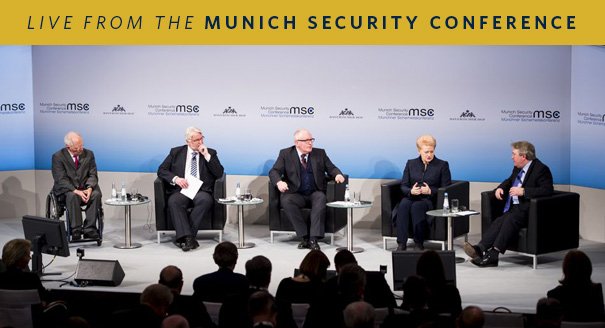Carnegie Europe was on the ground at the 2017 Munich Security Conference, offering readers exclusive access to the debates as they unfolded and providing insights on today’s most urgent international issues. Check out our live coverage here.
*
The title could have been a complete turnoff: “The Future of the European Union: United or Divided?” But once the four panelists took to the podium for the first debate at this year’s Munich Security Conference, the fireworks began.
Now, the two main protagonists, Frans Timmermans, first vice president of the European Commission (who, among other things, is responsible for the rule of law), and Witold Waszczykowski, Poland’s foreign minister, know each other well. Very well, in fact. Their paths have crossed frequently, particularly since Poland’s conservative Law and Justice government made changes to the way the country’s Constitutional Tribunal functioned and how its judges would be chosen.
Timmermans, the EU’s hit man when it comes to speaking out about defending values and upholding the EU’s treaty, has repeatedly challenged the way that Warsaw is interfering in the rule of law. And it was precisely the rule of law and the exercise of the rule of law as seen by Brussels and Warsaw that led to a public spat between the two men.
It all began with Timmermans defending what Europe is based on: values and diverse societies. “Successful societies are diverse societies,” he said. “The national way does not offer protection.” And he continued: “Let’s rekindle this feeling that every European citizen has the right of equal treatment before the law. And we all respect that law. . . . A Constitutional Tribunal has to respect the rules of your constitution,” he told Waszczykowski.
“Please allow us to respect our own constitution, not your vision of our constitution,” replied the foreign minister. “You asked for the Venice Commission,” replied Timmermans, referring to Council of Europe’s advisory body on constitutional issues. “The only thing they got from you is an insulting reply,” Timmermans quipped back.
Wolfgang Schäuble, Germany’s finance minister, and Dalia Grybauskaite, the president of Lithuania, were the other two panelists. Schäuble, sensing the growing tension between the two protagonists and because relations between Germany and Poland have to be managed so carefully by Berlin, was conveniently asked a question about whether Europe needed more integration. “We have to convince some of our Eastern European partners that the biggest achievement of European integration is that we have overcome the division of Europe—which was a result of World War II,” he said.
That answer would not have been lost on Poles, who longed so much to be back in a united Europe. “European unification is without border controls. It would be very difficult to fall back on that,” Schäuble added.
When Schäuble was asked if a two-speed Europe was in the cards, he was very careful not to offend Poland. “We need some flexibility. Some member states—their way of thinking—is a little bit different with regard to European integration. We have to respect this.” That was putting it very diplomatically.
To cut a long story short, this debate exposed a Poland that believed it was being victimized and misunderstood by what Waszczykowski called “those bureaucrats in Brussels,” who, like Timmermans, live in an “ivory tower.”
When the floor was opened up to questions, Poland was reminded that it received EU subsidies in the form of structural funds worth €50 billion over a five-year period. Waszczykowski hit back, at Germany.
“Yes, €50 billion of subsidies go to Poland. And 80 percent goes back to Western Europe. We’re modernizing the infrastructure, using Western technology. Who is earning this money? German [firms] make €50 billion in Poland,” he added. Waszczykowski didn’t mention how many jobs were created in Poland, how many Poles work in Germany, and—more importantly—that Polish-German bilateral trade is bigger now than German-Russia trade.
Schäuble was wise enough to choose his words. Timmermans chose his, too, as the debate drew to a close. The EU, Timmermans said, is about more than just the four freedoms, which consist of the free movement of people, services, goods, and capital. “It is about Article 2 of the EU treaty.” Timmermans then read it out. “These laws are common to the member states,” he insisted. “An internal market and common currency are tools to strengthen our common values. Our destiny is based on our values.”
For Schäuble, it was about more integration. “It is always about bringing European integration forward,” he said. “We know that from the very beginning. In five years I think we will have convinced more citizens in Europe that Europe matters.” Grybauskaite nodded.
Photo by Munich Security Conference / Koerner






